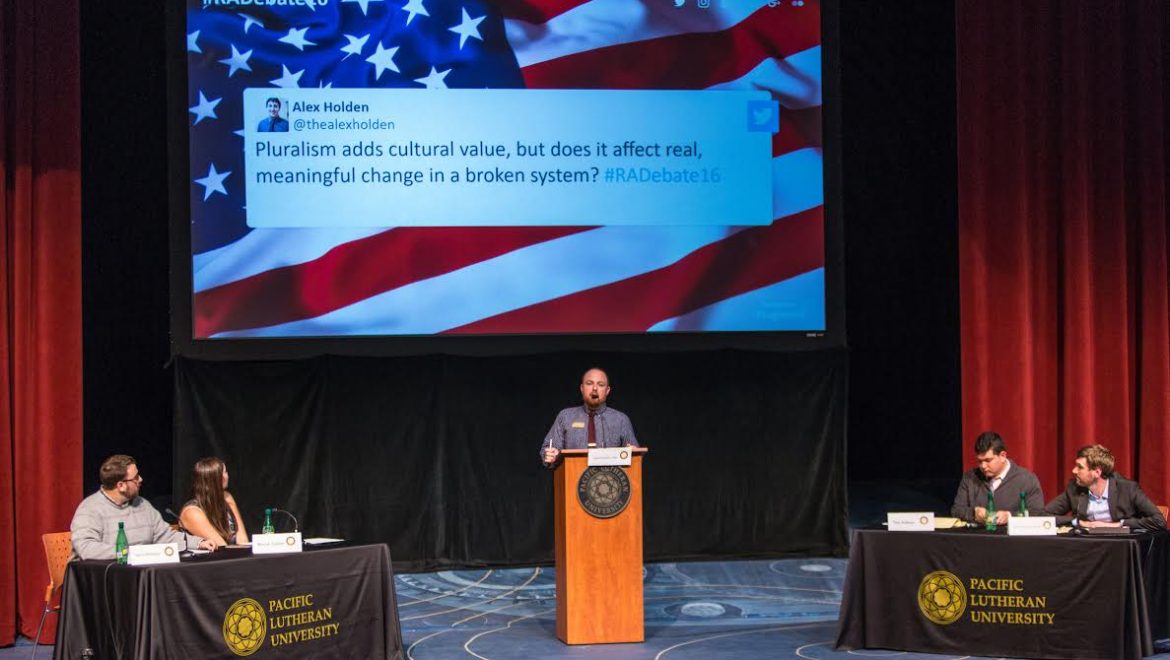Assistant Professor of Communication Justin Eckstein has held an unwavering interest in argumentation, from a debate summer camp after seventh grade through all levels of college — undergraduate, graduate and doctorate.
“Debate taught me how to construct arguments, it introduced me to a whole host of literature that I would have never been exposed to otherwise. It spiked my curiosity in alternative positions. It also gave me material advantages, it introduced me to a network of potential scholars that have mentored me through all these years, it gave me money to go to college, graduate school, it paid for me to get a doctorate, and to have my job here,” Eckstein said.
While serving as director of forensics for Pacific Lutheran University’s Speech and Debate Team (T.O.H Karl Forensics Forum) for the past three years, Eckstein has shared his passion for debate with the students he works with. After a national search in the 2015-16 school year, he was awarded a tenure-line position, affirming PLU’s commitment to debate.
“I think this new position means, more than anything, that there is a university promise to continue forensics,” Eckstein said, “recognizing that it is an important part of the communication curriculum.”
Beginning in the late 1890s and officially joining intercollegiate competitions in the 1940s, the speech and debate program has been a mainstay at PLU. For Eckstein, who came to PLU from the University of Denver after his postdoctoral work, the commitment to debate and social justice values attracted him to the university.
“Learning how to articulate your positions forcefully and reasonably and being able to advocate for yourself is something that everyone should be able to do. If we are unable to mediate our disagreements with words, what does that really leave us?” Eckstein asks. “I think learning how to craft arguments, how to evaluate arguments and how to engage other people’s positions is an important part of social justice.”
Social justice also includes the question of access, which Eckstein takes to heart. Debate is something that is rarely found in Tacoma and Parkland high schools, and Eckstein has worked hard to increase access for students to start their own debate team and learn argumentation skills. He works with the debate camp “Climb the Mountain,” which is held on PLU’s campus every summer for local youth.
“Debate is about cultivating an ethic of care, about learning different perspectives, how they interrelate to one another and how to be an engaged and active citizen,” Eckstein said.
With Eckstein at the helm, the speech and debate team won its first college tournament in more than five years and begun hosting debate camps for high schools. The debate team will continue to grow the program and the popular Ruth Anderson debate series, which brought community members to campus to argue the subject of third-party voting in 2016.
Alongside his work in debate, Eckstein continues his own scholarship. He studies alternative positions, including work in multi-modal argumentation and how our senses influence our reasoning. Recently, he has studied sound as it relates to argumentation, how it can make us feel, how it works in advertisements and how it impacts the way we reason.
“As a discipline, argument tends to approach the ways people resolve disagreement as visual,” Eckstein said. “For instance, work on political advertisements might focus on the visuals or the text of the words uttered. But this sort of analysis misses the important way sound functions to frame the images and text. This means analyzing, the music behind the ad, the sound effects and tone. ”
Eckstein is currently working on several academic papers on the subject. While his research continues, a busy year of teaching and debating lies ahead.
“I am just excited that the university realizes that forensics is really important for developing good citizens,” Eckstein said. “I look forward to continually working with an amazing group of students.”
By Genny Boots ’18

